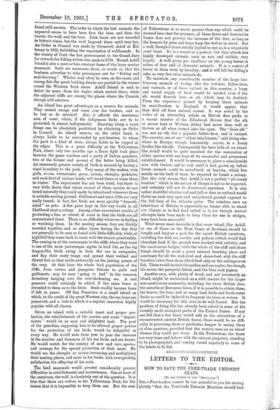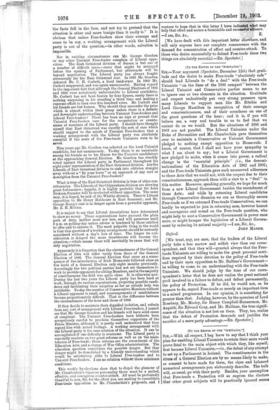LETTERS TO THE EDITOR.
HOW TO SAVE THE FREE-TRADE UNIONIST SEATS.
[To TITS EDITOR OF TITE "SPECTATOR.") SIR,—Free-traders cannot be too grateful to you for stating plainly "that the Free-trade Unionist Members should look the, facts full in the face, and not try to pretend that the situation is other and more benign than it really is." It is obvious that unless Free-fooders show their courage and cease to be coy, a working arrangement with the Liberal party is out of the question,—in other words, salvation is
impossible.
Nor in existing circumstances can Mr. George Goschen or any other Unionist Free-trader complain of Liberal oppo- sition. The East Grinstead division of Sussex is but one of a number of difficult cases,—cases that might be arranged before the opening of Parliament, but afterwards will be beyond negotiation. The Liberal party has always fought strenuously for the East Grinstead seat. In 1895 Mr. Goschen defeated Mr. C. H. Corbett, a local landowner. In 1900 Mr. Corbett reappeared, and was again unsuccessful. Having regard to the important fact that although the General Elections of 1895 and 1900 were notoriously unfavourable to Liberal candidates, Mr. Corbett has not been beaten by four figures, surely there is nothing surprising in his standing a third time and making a supreme effort to turn over five hundred votes. Mr. Corbett and his friends are but human. Why should they surrender the prize which is almost within their grasp unless there is a definite and downright understanding between Unionist Free-fooders and Liberal Free-traders ? There has been no sign at present that Unionist Free-fooders care for the co-operation or counte- nance of members of the Liberal party. I should have thought myself that East Grinstead was exactly the sort of case which should suggest to the minds of Unionist Free-fooders that a working arrangement with the Liberal party was absolutely essential if the seats of the Free-trade Unionists were to be saved.
Nine years ago Mr. Goschen was selected as the local Unionist candidate, but not unanimously. To-day there is no unanimity among his friends as to his fitness for the Unionist candidature at the approaching General Election. Mr. Goschen has steadily voted against the Liberal party in Parliament throughout his eight years' representation of the East Grinstead division. Are the Liberals of East Grinstead division to sink into oblivion straight away without a " By your leave " or an approach of any sort or description from the Unionist Free-fooders ?
What is true of the East Grinstead division is true of other con- stituencies. The Liberals of the Chippenham division are showing great forbearance ; happily, it is highly probable that Sir John Dickson-Poynder will be re-elected without opposition. The same may, it is hoped, be said of the Whitby division. There is Liberal opposition to Mr. Henry Hobhouse in East Somerset ; and Mr. George Kemp's seat is in danger again from a powerful opponent, Mr. E. H. Holden.
It is unjust to say that Liberal Associations have determined to show no mercy. These organisations have pursued the plain path of duty, neither more nor less, and will persevere until 8 p.m. on polling-day unless advice is tendered by those entitled to offer and to enforce it. The most palpable thing in the world is that this question of a working arrangement should be seriously considered without a day's loss of time. The longer its con- sideration is delayed the more troublesome will become the situation,—which means there will inevitably be cases that will defy negotiation.
Apparently it is forgotten that the circumstances of the General Election of 1904 will differ vastly from those of the General Election of 1886. The General Election that came as a conse- quence of the introduction of Irish Home-rule followed close on the heels of a General Election only eight months previously. Accordingly the two political parties had not set themselves to work to provide opponents for sitting Members, and in the majority of constituencies the field was quite clear. It is otherwise now. During the last two years the Liberal party has been hard at work, through its various organisations, proposing possible candi- dates and facilitating their adoption as far as outside help was justifiable. To-day the number of Conservative Members without a Liberal opponent is small, and rearrangements of candidatures become proportionately difficult. That is the difference between the circumstances of the hour and those of 1886.
If they decide to maintain their dignified isolation, and refrain from any sort of arrangement with Liberal Free-traders, I cannot see that Mr. George Goschen and his friends will have solid cause of complaint. The Unionist Free-fooders have hitherto been scrupulously careful to proclaim themselves supporters of the Prime Minister, although it is pretty well understood that they regard him with mixed feelings. A working arrangement with the Liberal party is the sane solution of the situation. It can be accomplished if one difficulty is overcome. The Liberal party is especially resolute on two great reforms as well as on the main- tenance of Free-trade; those reforms are the amendment of the Education Acts, and a change of War Office administration. The education question constitutes the possible danger. But that danger might be demolished by a friendly understanding which would be satisfactory alike to Liberal Free-traders and to Unionist Free-fooders. I see no solution without these minimum conditions.
This week's by-elections show that to dispel the glamour of Mr. Chamberlain's vigorous personality there must be a united, effective, and courageous counter-attack. All must be profoundly thankful to you, Sir, for the effort you are making to consolidate Free-trade opposition to Mr. Chamberlain's proposals, and I venture to hope that in this letter I have indicated what may help that effort and-secure a formidable and successful alliance.
[We have dealt with this important letter elsewhere, and will only express here our complete concurrence with the demand for concentration of effort and counter-attack. To those who desire successfully to defend Free-trade these two things are absolutely essential.—En. Spectator.]



















































 Previous page
Previous page